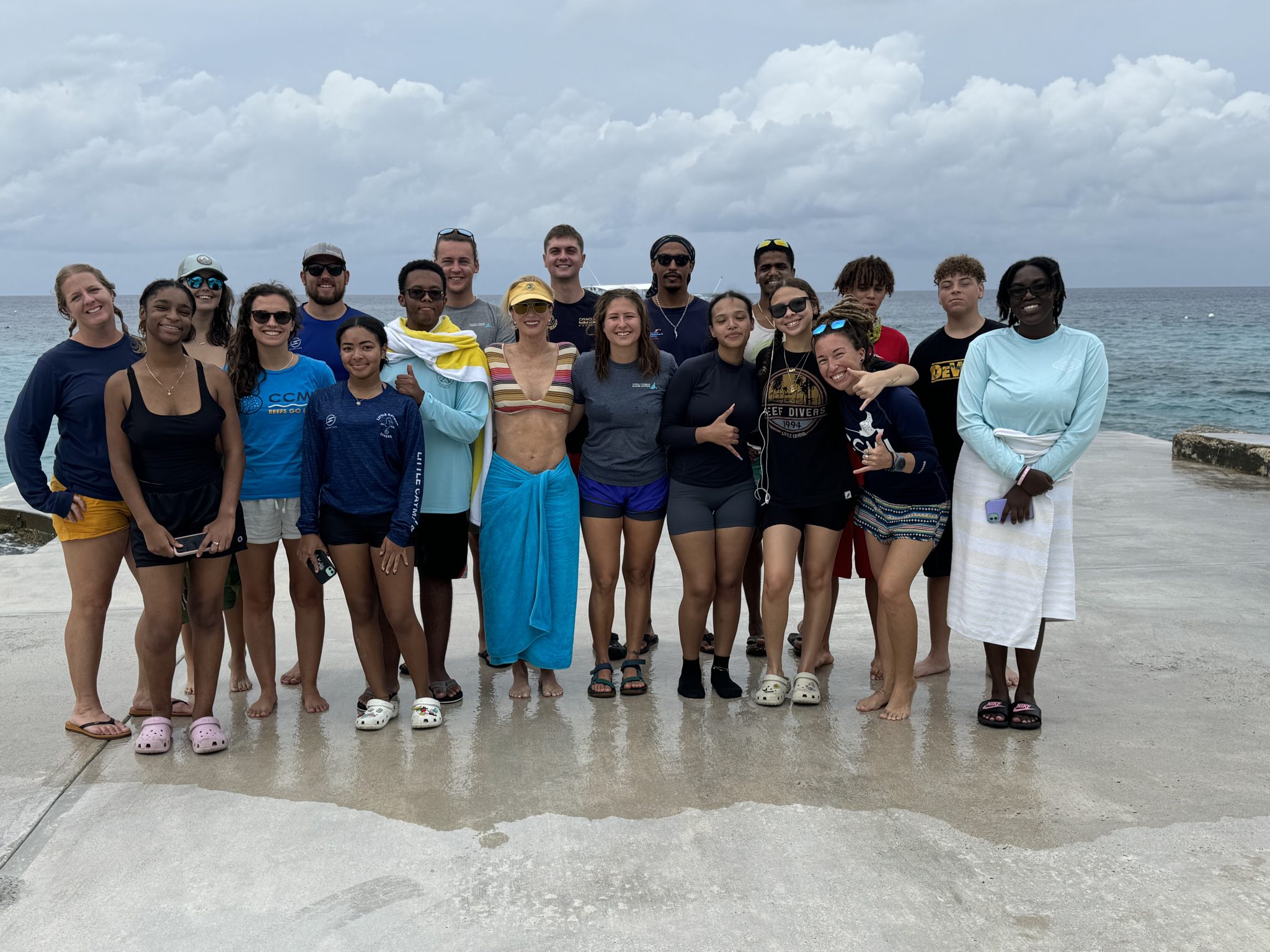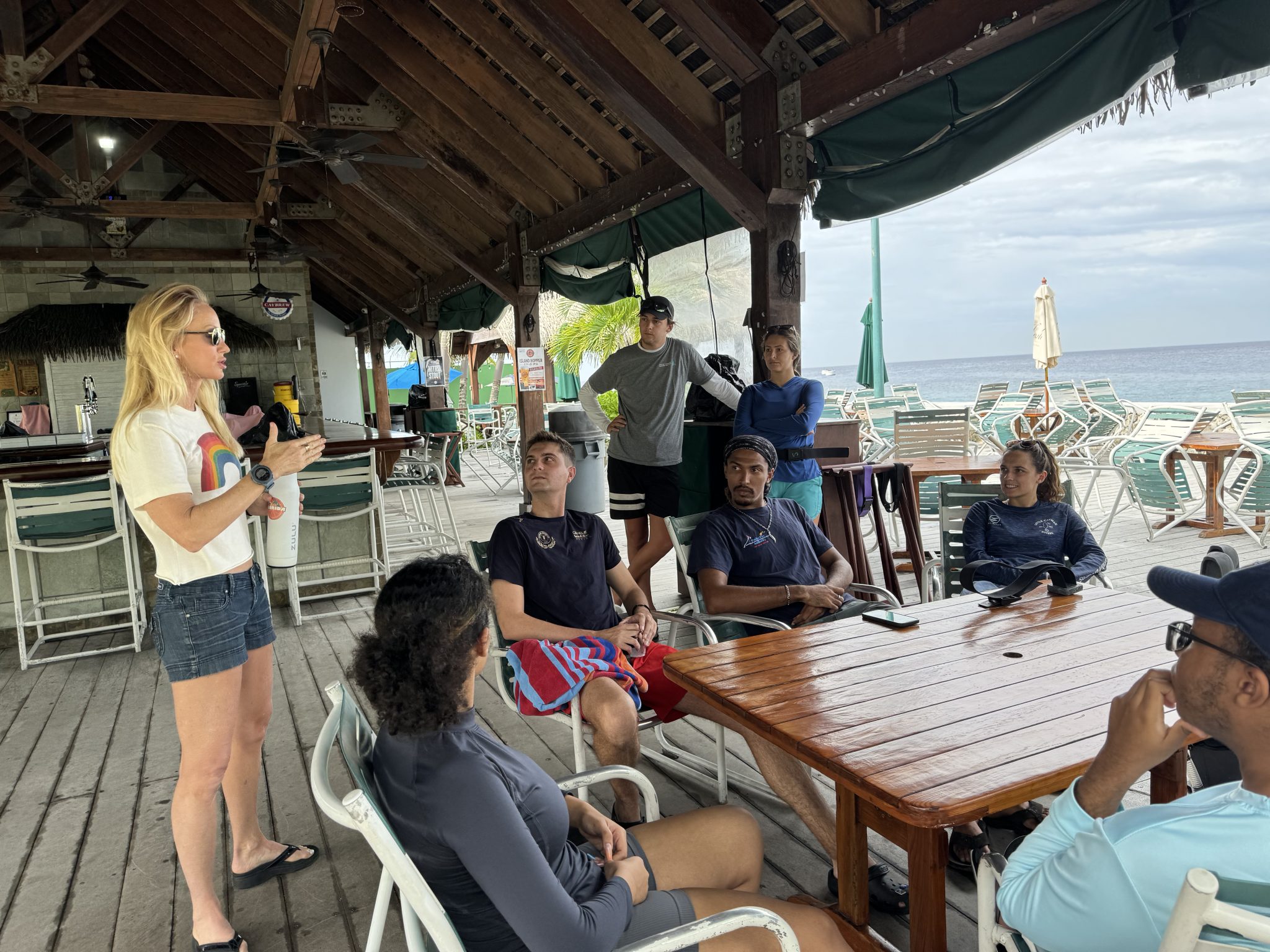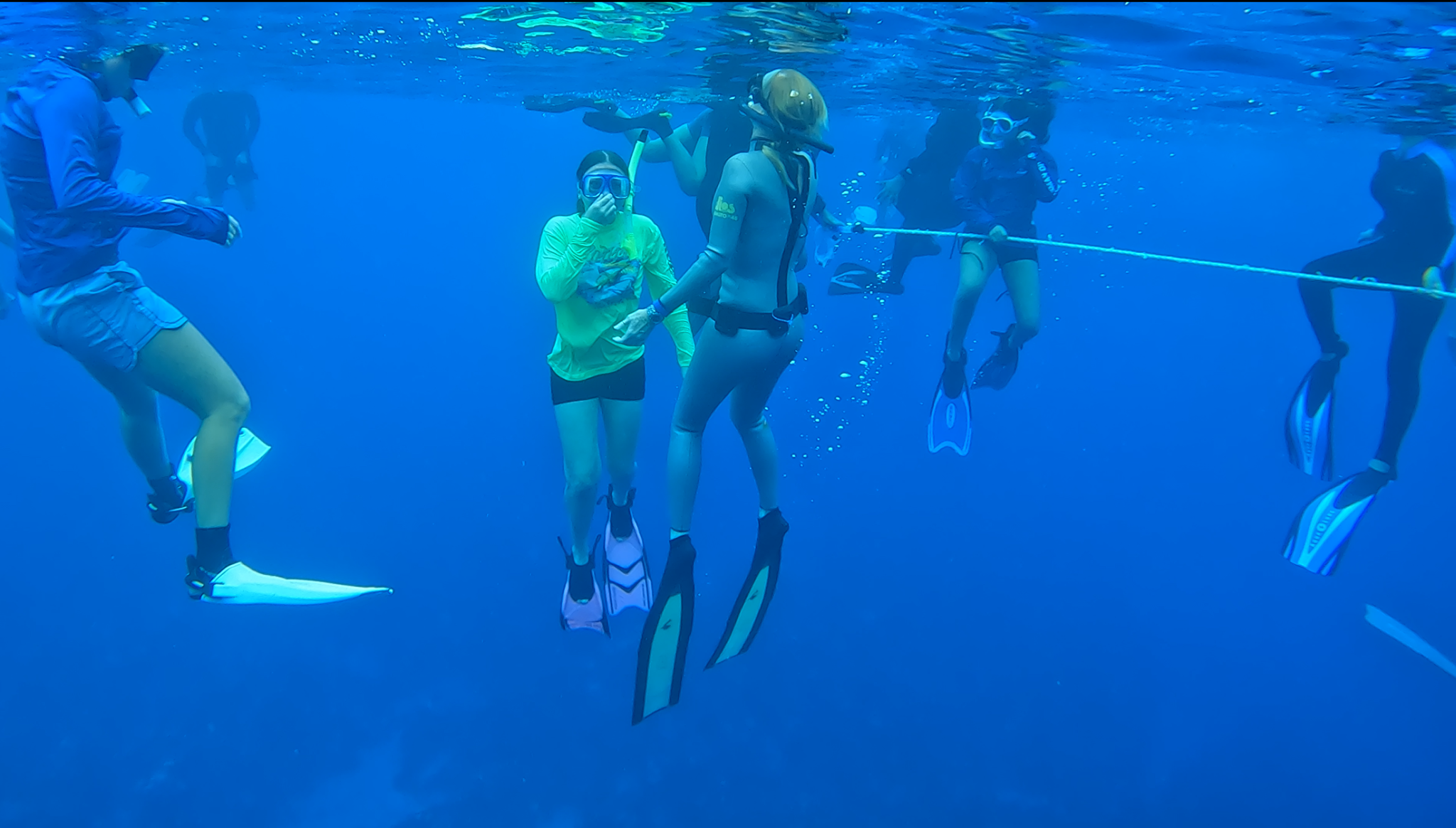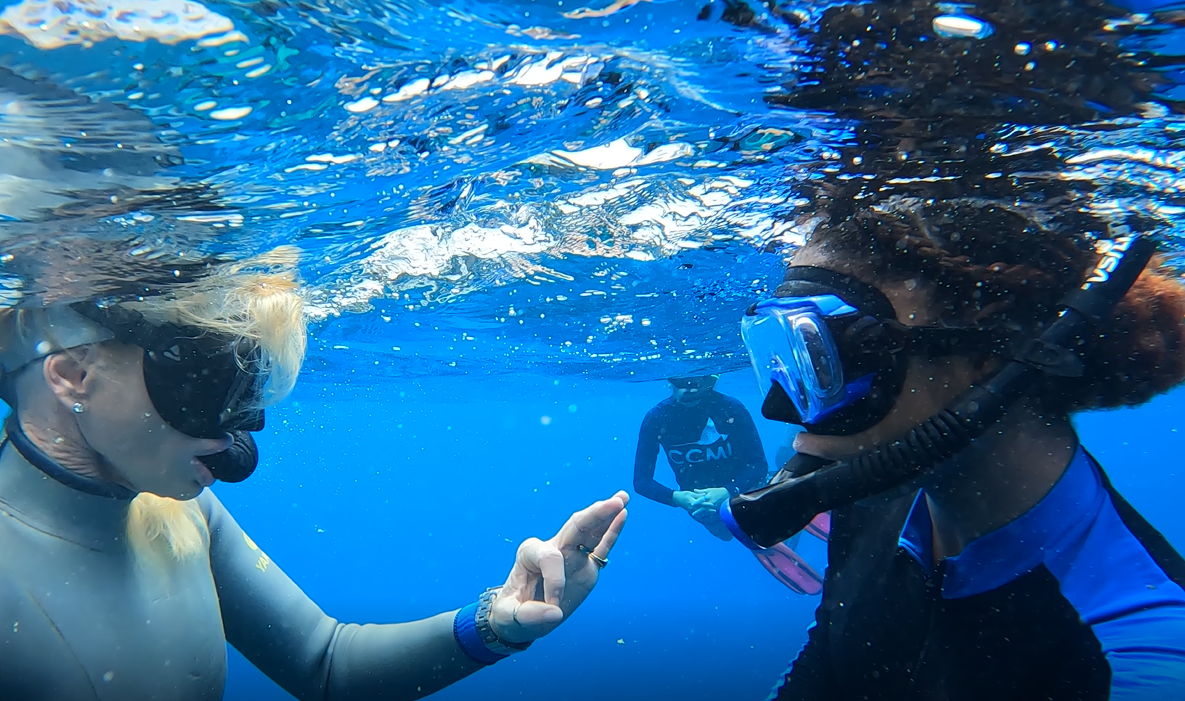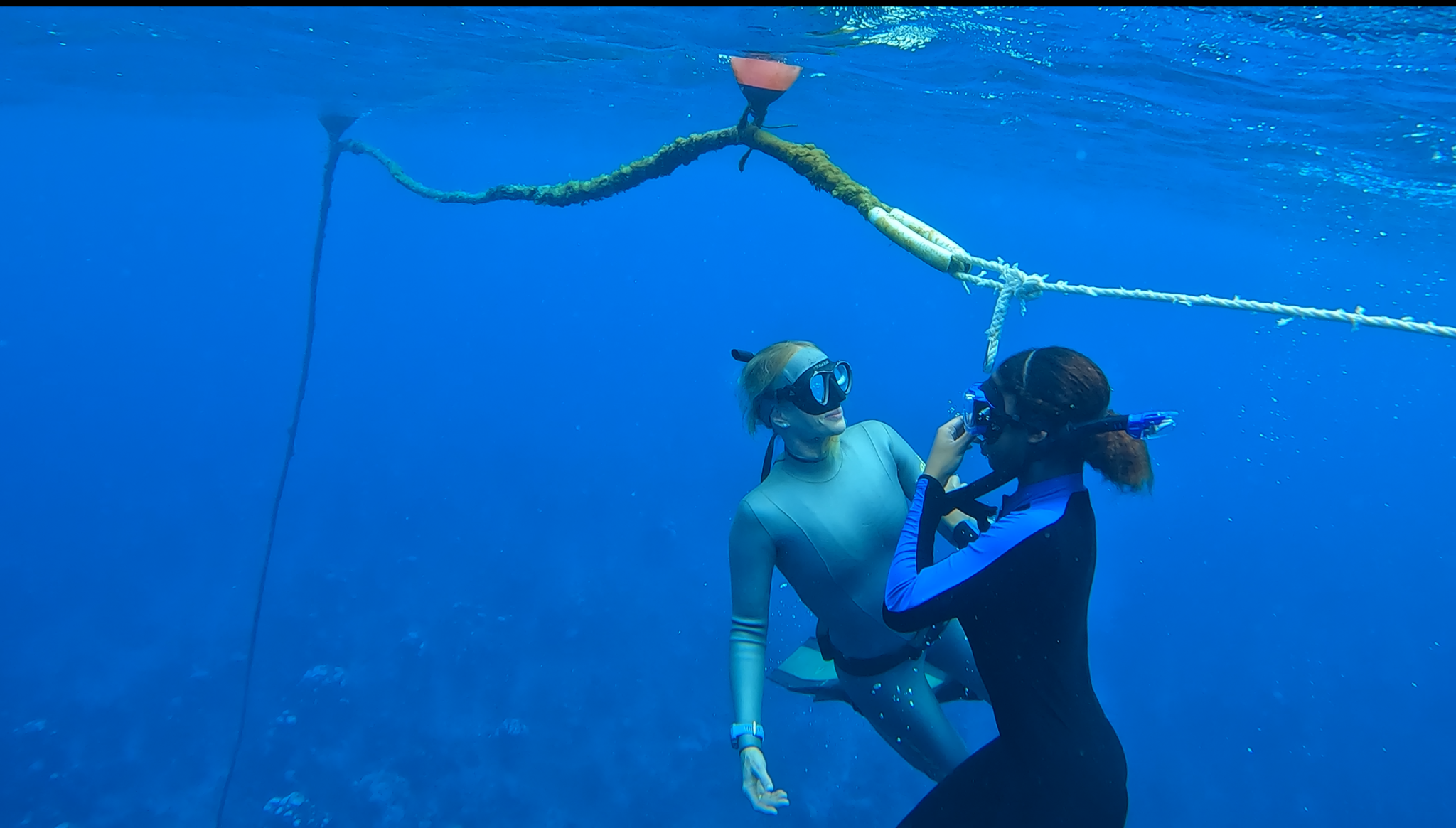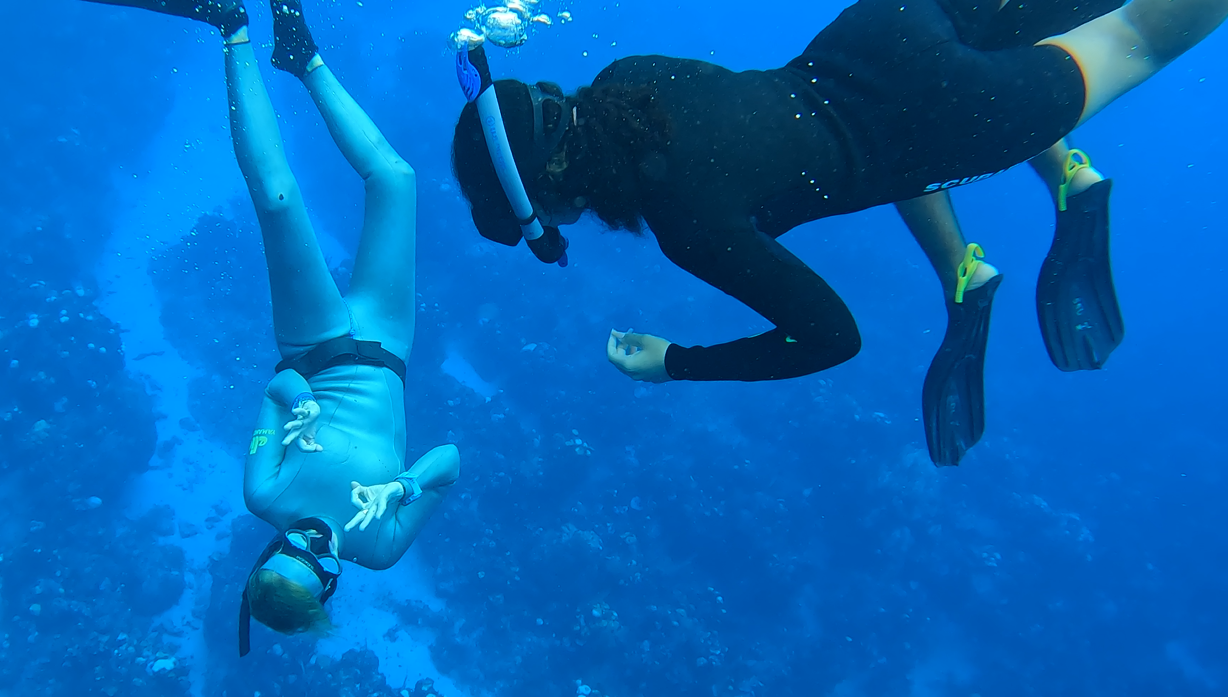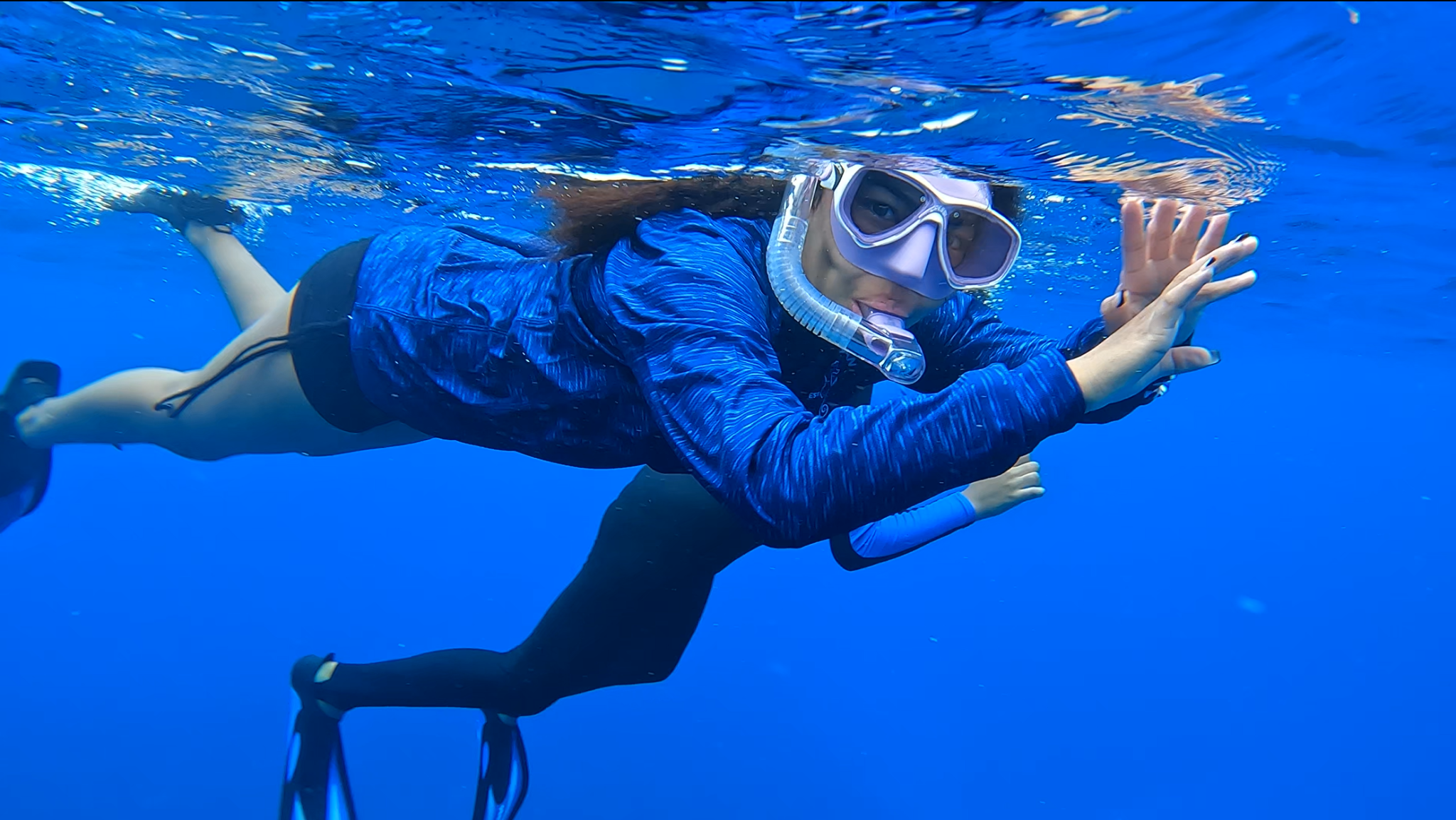Freediving Blogs
Snorkeling vs. Freediving – What’s the difference?
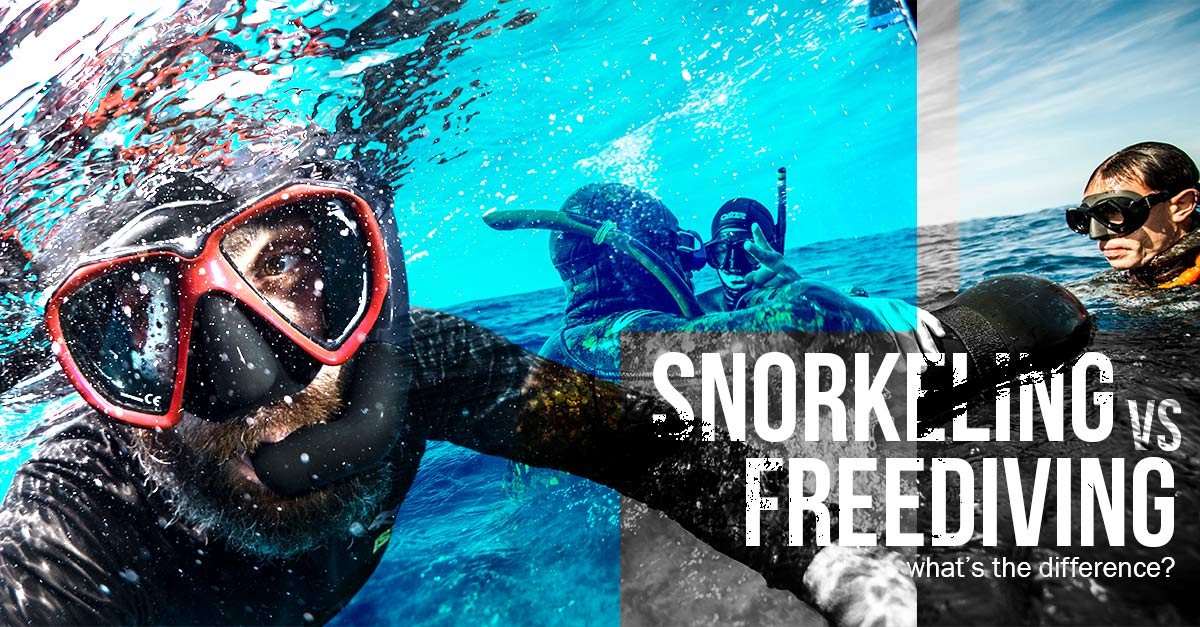
Being in the water with just mask, snorkel and fins is all the same, right? Not quite. There are three ways in which you can enjoy the water using minimal equipment. These are snorkeling, skin diving and freediving. What are the differences? I’m glad you asked.
Snorkeling
First, we will cover the simplest form – snorkeling. To enjoy snorkeling you must have a mask, snorkel and, possibly, fins. Without these, you’re just swimming.
You need a mask to see underwater. A snorkel makes it possible to breathe without lifting your head. The remaining equipment is optional. Some things that might help you enjoy snorkeling more include:
- Comfortable, full-foot fins
- A rash guard or wetsuit to protect you from stings, abrasions, the sun and getting cold
- A snorkeling vest to increase your visibility and floatation on the surface
Once you have your gear, grab your buddies and hit the water. You can enjoy hours of snorkeling with minimal training. A good place to start is the Snorkeler course from Scuba Diving International (SDI).
Snorkeling is essentially swimming on the surface while breathing through your snorkel. Any dives you make will be brief and shallow — no more than 5 m/16 ft. This is like the deep end of a swimming pool.
Every day, millions around the world enjoy snorkeling. This includes:
- Families on vacation or at home on the lake
- Scuba divers between dives
- People who want this to be the extent of their in-water experience
Snorkeling courses are readily available almost anywhere snorkeling is popular. They help make snorkeling a safer and much more enjoyable experience.
Skin Diving
The sport of skin diving is the next level of diving without scuba. It gained popularity in the 1940s and 1950s, chiefly among soldiers and sailors coming home from overseas. Skin diving is generally more involved than snorkeling. It uses largely the same gear, but without the snorkel vest.
Skin divers typically go slightly deeper and stay somewhat longer than snorkelers. Hitting depths in the 5-10 m/16-33 ft range, skin dives generally last around 20-30 seconds. These are short dives to snap pictures of fish or perhaps collect dinner. In the past, many agencies required skin dives as part of the certification process.
Freediving
If snorkeling represents one end of a spectrum, freediving represents the other. It is significantly more complex both in terms of skill and risk.
People have been freediving for commerce and sustenance since the dawn of time. As one example, the Ama of Japan have been doing this for centuries.
There were many notable freediving pioneers including US Navy dive instructor Robert Croft, Jacques Mayol and Enzo Majorca. Breath-hold diving played a significant role in World War II with the USA, Italy, the UK and others employing freediving special operations troops. The legendary Jacques-Ives Cousteau was a freediver before inventing modern scuba with Emile Gagnan.
Modern competitive freediving traces its roots to 1949. This was when Hungarian-born Italian Air Force captain Raimondo Bucher won 50,000 lire by diving to a depth of 30 m/100 ft off Naples. Scientists predicted the pressure would crush Bucher’s lungs at this depth. They were wrong.
Today freediving is among the fastest-growing water sports. Although freediving has its competitive side, not all freedivers compete. Some spearfish. Some simply enjoy the activity.
Modern freedivers use highly specialized equipment. This includes:
- Long-bladed fins which provide exception propulsion
- Low volume masks which make equalizing easier
- Special wetsuits which are warmer and more flexible than those used by scuba divers
Instead of the inflatable buoyancy devices scuba divers use, freedivers weight themselves for neutral buoyancy at 10-20 m/33-66 ft. Doing so makes controlling buoyancy easier and helps ensure a safe return to the surface.
The threshold for freediving is a depth of 10 m/33 ft and bottom times exceeding 30 seconds. The risks involved are substantial. This is why not only proper equipment but proper training is essential.
Fortunately, you can get this training through Performance Freediving International (PFI), the world’s leading freediver training organization. Like SDI, PFA is a member of the International Training family. PFA offers a wide variety of courses from beginning freediver through instructor trainer.
Whether your interests tend toward snorkeling or freediving, SDI and PFI have the right course to get you started.
To find out more about International Training, visit www.tdisdi.com.

Blogs
Freediver Christian Redl Sets His 13th World Record at Lake Neufeld

Freediving champion Christian Redl achieved his 13th world record at Lake Neufeld together with his teammates by completing 55 dives of 20 meters with just one single breath each, a feat that in total is comparable to the depth of the Mariana Trench! Within 4 hours and 26 minutes out of a planned total of 5 hours, the project was made possible thanks to the support of Cressi, which supplied high-quality equipment to Redl and his fellow athletes.

Cressi, the official sponsor of the project, has been working with Redl since the beginning of his career, establishing a relationship that goes beyond simple collaboration and has become a true friendship over the years. Cressi’s support has been fundamental to the success of this venture and this highlights the reliability and innovation of its products.

The aim of the dives was not only to break a new record but also to raise awareness of the pollution of our planet’s waters, a subject dear to both Redl and Cressi.
It remains to be seen whether Redl will continue its record hunt, but one thing is certain: with Cressi’s support, each new challenge will be met with the utmost quality and determination.
Check out all the latest freediving equipment from Cressi here.
Blogs
CCMI alumni learn to freedive from world record holder Tanya Streeter
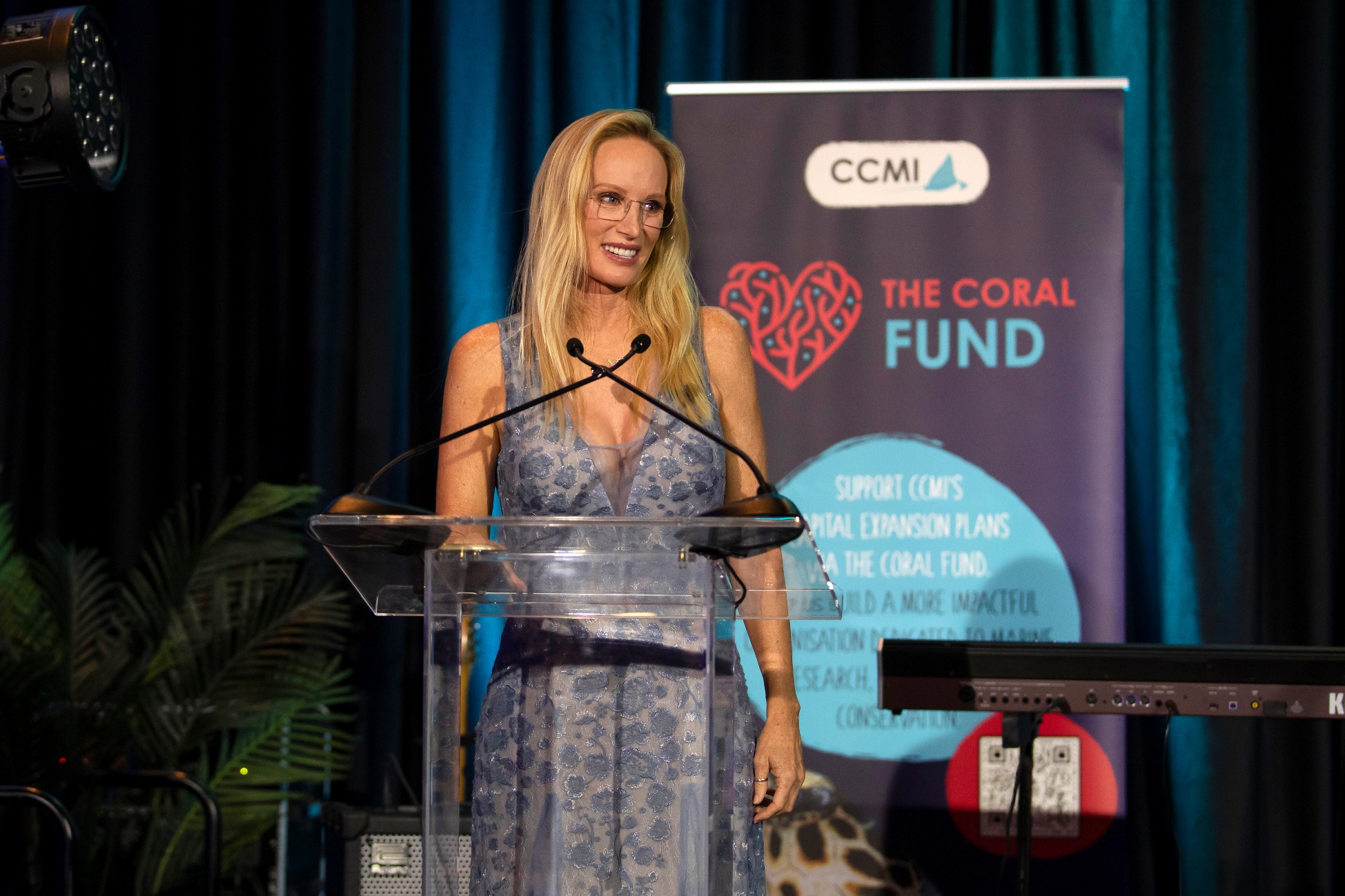
CCMI’s 25th anniversary celebrations included Tanya Streeter leading a freediving clinic for CCMI alumni, giving Festival of Seas keynote address
To help celebrate the 25th anniversary of the Central Caribbean Marine Institute (CCMI), the organisation enlisted the help of world record holding freediver and former Cayman resident Tanya Streeter. Invited to give the keynote speech at the annual Festival of Seas gala on 4 November 2023, Tanya eagerly agreed to also host a freediving clinic for young Caymanians who participated in education programmes at CCMI to give back to the Cayman community.
Returning to the island where she was born and raised, Tanya led a half-day freediving clinic at Sunset House with the support of Sunset Divers. CCMI education programme alumni were invited to register, and 11 Caymanians, ages 16-26 representing a span of 10 years of taking part in the range of CCMI education programmes, attended the clinic. Some of the alumni participated in more than one CCMI programme over the years, and several are now employed in a related industry in the Cayman Islands, a testament to the importance of CCMI’s scholarship opportunities for Caymanian students.
When asked what it meant to Tanya to host this freediving clinic in Grand Cayman, she said, “I cannot overstate what a huge personal impact it has on me to come back to have this opportunity to work with young Caymanians. They are associated with CCMI, so they know about the ocean and about how important ocean health is here for us. But to be able to connect with young people in a realm that I’m good at and is important to me, and to see them grow a little bit personally, is huge. It’s my absolute favourite thing to do!”
Called ‘the world’s most perfect athlete’ in 2002 by Sports Illustrated, Tanya discovered her record-breaking gift for freediving in 1997, and in the following decade broke 10 world records, many of them previously held by men. To this day, she still holds the longest-standing world record in the sport, having dived on a single breath to a depth of 525ft/160m in the No Limits discipline off the coast of the Turks and Caicos Islands in August 2002. If anyone is qualified to help others begin their journey into freediving, Tanya Streeter is at the top of the list.
The clinic started with a briefing and a meditation session, led by Tanya, to get the mind and body ready to freedive. Participants practiced meditation exercises, breathing techniques to help open the diaphragm and work the lungs and muscles, and important stretches. Next, Tanya gave an in-water safety briefing, which emphasized buddy pairs, proper in-water breathing techniques, and not pushing oneself too hard. In total the group spent about 90 minutes in the water in selected buddy pairs practicing freediving while under the watchful eye of CCMI’s in water safety teams. Tanya spent several moments with each freediver individually, observing them, and offering underwater support and topside coaching. After everyone had one-on-one coaching time with Tanya, the group snorkeled to the famous Sunset House mermaid statue, practicing their new, finely tuned freediving skills to dive to the mermaid (a depth of about 45-50 ft).
Before the clinic, participants had a wide range of skills and experiences in the water. Tanya provided one-on-one coaching, speaking to each person’s comfort level. One participant said it felt like it was only the two of them in the ocean. Tanya’s constructive corrections in the water helped participants realize instant success in their form and dives!
The following night, Tanya gave the keynote address to the more than 350 attendees at CCMI’s Festival of Seas gala at the Kimpton Seafire Resort & Spa. A passionate voice for the preservation of the marine environment, Tanya announced she would serve as a CCMI ambassador, focusing her energy on engaging the youth and young people in efforts to protect the ocean. She left attendees with the realization that the connection we have with the ocean is meaningful, and it paves the way to create protections and policies that will sustain the marine environment for the future.
While Tanya enjoys using her platform to communicate about the importance of marine conservation, she is very passionate about working with youth and introducing them to the ocean through freediving. “To see those barriers people are facing and to push through and grow even in a hour, and hour and a half. That’s huge. It’s absolutely my favourite thing to do.”
For more information about CCMI, please visit www.reefresearch.org.
About CCMI
CCMI is a not-for-profit organization founded in 1998 to protect the future of coral reefs, envisioning a world with vibrant oceans and healthy coral reef ecosystems. We seek to be the Caribbean’s premier marine research institute by delivering cutting edge research, transforming conservation strategy and developing education programmes of excellence – discovering and promoting real solutions to declining ocean health. Our plan is to invigorate key species and understand key ocean processes that drive reef resilience. We support early career scientists who are INNOVATING ways to improve coral reef health. We are TRANSFORMING conservation strategy and work to inspire the CHANGE that is needed to achieve our mission. CCMI are PIONEERS in the region working to reverse the declines of coral reefs.
-

 News2 months ago
News2 months agoIconic SS United States to become the World’s Largest Artificial Reef
-

 News3 months ago
News3 months agoBook Review – 52 Assignments: Underwater Photography
-

 Gear News3 months ago
Gear News3 months agoDYNAMICNORD – New German diving brand enters the British market
-

 News3 months ago
News3 months agoExploring Cenote El Pit: A Diver’s Dream
-

 Gear News3 months ago
Gear News3 months agoTry BARE drysuits (and maybe even win one!) this Friday with Sea & Sea at North West Dive Fest
-

 Marine Life & Conservation3 months ago
Marine Life & Conservation3 months agoBook Review: Coral Triangle Cameos
-

 Blogs2 months ago
Blogs2 months agoDive the Egyptian Red Sea this Autumn with Regaldive
-

 News3 months ago
News3 months ago2024 Ocean Art Underwater Photo Competition Announced















